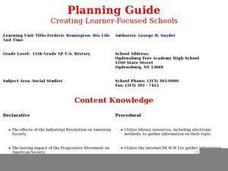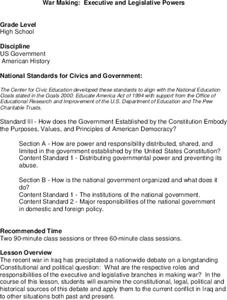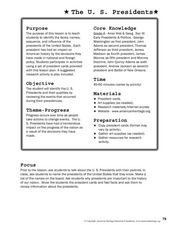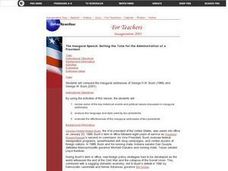Curated OER
Exploration of North America
Fifth graders examine some famous explorers who have helped to discover our country. They discuss explorers from three countries today. They are: Spain, Portugal, and England.
Curated OER
The Debate in the United States over the League of Nations: Disagreement Over the League
High schoolers read the words and listen to the voices of some central participants in the debate over the League of Nations.
Curated OER
Political Spectrum
In this government worksheet, students identify and describe the differences between each part of the political spectrum by listing some points under each title in the chart. Then they choose any of the 9 issues listed, discuss and...
Curated OER
Undercover in the Secret State
Students examine the current conditions in North Korea. They view and analyze a CNN documentary, research a dissident, answer and discuss questions about the documentary on conditions in North Korea, and identify the technology used by...
Curated OER
Sources of the Cold War
Fourth graders make a time line from their notes and outlines of the causes of the Cold War.
Curated OER
Frederic Remington: His Life and Time
Eleventh graders discuss the life of frederic remington and visit his museum. In groups, they research topics involving remington and write reports. They assemble their findings into a Web page about remington.
Curated OER
New World, Old Evils: Latin America and the Holocaust
Pupils examine how Latin America was affected by the Holocaust in Europe. In groups, they research topics related to Latin America and World War II. They interview survivors if possible and discover how entire nations were effected by...
Curated OER
George Washington on the Sedition Act
Students investigate the Sedition Act and George Washington's position on the act. In this United States Colonial history lesson, students read about George Washington's position on the Sedition Act. Students then participate in a...
Curated OER
The Cold War and Development of Post-War America
Students view examples of political advertisements during the years of 1952 through 1964. After viewing, they discuss how the Cold War and the threat of Communism affected the development of the United States. They compare the Cold War...
Curated OER
War Making: Executive and Legislative Powers
Students examine Constitution and what it says about war-making power, contrast roles and responsibilities of executive and legislative branches of government when it comes to making war, become familiar with important 20th and 21st...
Curated OER
What do we know about Iraq?
Students develop viewpoints on world issues and concerns. Students review facts on historical time periods. Students compare past happenings to present situations in history. Students differentiate between various forms of ethnic...
Curated OER
Lincoln's Spot Resolutions
Students examine the controversy and varying points of view leading up to the 19th century Mexican War. They research examples of anti-war movements throughout history and write editorials about their findings.
Curated OER
The U.S. Presidents
Students identify the Presidents of the U.S. by their physical characteristics and their impact on America. In this Presidents lesson plan, students read about each President, look at their pictures, and identify each of them based on...
Curated OER
President Madison's 1812 War Message: A Documentary Review
High schoolers analyze primary documents to determine why President Madison believed it was important for the US to declare war with Great Britain. Students research documents on the Internet to determine President Madison's argument for...
Curated OER
The Decision to Americanize the War in Vietnam
Students research the major events of the Vietnam War and construct a timeline. They do the same with the presidency of Lyndon B. Johnson or the 1960's. They act as an advisor to President Johnson to recommend a course of action...
Curated OER
Memorandum of a Conference with President Eisenhower after Sputnik
Learners document and list excerpts from a document that shows how calmly officials reacted to the launching of Sputnik. They research contemporary magazines and newspaper articles of the day as well.
Curated OER
The U.S. Recognition of the State of Israel
Students research the political aspects of the U.S. position in the Middle East, considering, for example, Truman's position in view of the 1948 presidential election. They examine a telegram sent by the Secretary of State, George C....
Curated OER
You Mean I Am Part of History?
Fourth graders open the lines of communication between family members and to gain a historical understanding about family history. They research and interview their grandparents and parents and create a research paper.
Curated OER
The Inaugural Speech: Setting The Tone For The Administration Of A President
Students investigate the Inaugural Speech of the President of The United States while comparing two speeches. They conduct research to find the two speeches on the internet and look at them side by side. The lesson includes background...
Curated OER
To War or Not To War!
Ninth graders examine the various types of propaganda used during World War II. In groups, they make notes on each example and determine why they believe the opinion of the United States involvement in the war changed. They share their...
Curated OER
Selling Warfare - Propaganda Posters
Students examine the use and purpose of propaganda posters during World War I. They work in groups to create a propaganda poster supporting a nation's war effort.
Curated OER
The Great Society and A Thousand Points of Lights
Students compare 2 preseidental speeches. In this presidential agenda lesson, students compare and contrast a Lyndon B. Johnson speech with a George H. W. Bush Speech.
Curated OER
Vietnam: A Divided Nation
Eleventh graders examine events leading up to and during the Vietnam War. They research assigned topics utilizing interviews, Powerpoint presentations, timelines, and collages in their presentations.
Curated OER
United States-Japanese Relations in Post World War II Era
Ninth graders analyze political cartoons and posters relating to the United States and Japan in the period following World War II. They discuss the positive and negative consequences of the United States occupation of Japan.

























